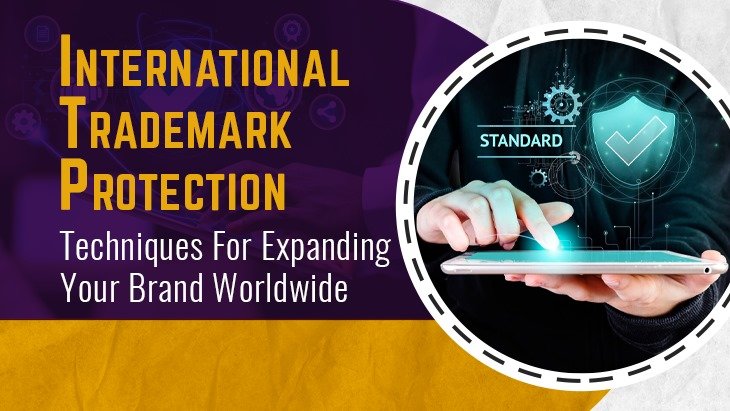The expansion of your brand into overseas markets can be an exciting opportunity for the success of your business. Global growth does, however, provide difficulties, particularly with regard to brand identification protection. Your brand can suffer legal conflicts in overseas markets, intellectual property theft, or counterfeiting without appropriate trademark and brand protection. This page looks at important tactics for safeguarding global trademark rights and making sure your brand stays under protection everywhere.
Understanding the Importance of Global Trademark Protection
A trademark distinguishes your brand from others by acting as its identification. It can feature a firm name, logo, motto, or perhaps unique packaging. Although your trademark might be safeguarded in your native tongue, it does not automatically apply elsewhere. Ignoring registration of your trademark abroad could expose your brand to illegal usage, counterfeiting, and brand dilution.
Protection of international trademarks is absolutely vital for:
- Preventing illegal outside third-party brand name use.
- Guaranteeing legal ownership of your brand in many countries.
- Avoiding expensive legal conflicts around trademark infringement.
- Developing brand consistency and consumer confidence everywhere.
Techniques for Protecting Your Trademark Worldwide
Protection of international trademarks calls for a calculated approach. These are some important tactics to give thought to:
1. Conduct Comprehensive Trademark Research
Investigate trademarks carefully with help of best trademark search tools to be sure your business name or emblem isn’t already in use before entering a new market. Under a “first-to-file” policy, several nations grant legal ownership to the first person to register a trademark independent of who first used it. To prevent confrontations:
- Consult official trademark databases, including WIPO (World Intellectual Property Organisation), EUIPO (European Union), and United States PTO.
- See trademark lawyers with expertise in foreign trademark law.
- See domain name availability to avoid cybersquatting problems.
2. Register Your Trademark Internationally
International trademark registration can be done mostly through two routes:
A National Trademark Registration: If your company is growing to just a few particular nations, think about registering for trademarks straight with their national intellectual property rights. This can help when aiming for important markets with distinct legal systems.
B. The Madrid System of Foreign Registration: Under management by WIPO, the Madrid System provides a simplified approach for registering trademarks across several nations using one application. Advantages of the Madrid System consist of:
- Paying one set of costs and submitting one application in one language.
- More effectively managing your trademark portfolio.
- Providing defence for other nations as your company expands.
3. Understand Country-Specific Trademark Laws
One nation’s trademark laws differ greatly from another’s. Some nations, including China, have rigorous “first-to-file” policies that could let bad-faith actors register your brand before you do. Requirements for trademark classifications and protection length vary across countries. It is vital to:
- Find out the legal criteria of any nation you intend to grow into.
- Hire legal advice conversant with local intellectual property rules.
- Track and protect your trademark rights in every country.
4. Monitor and Enforce Your Trademark Rights
Maintaining and enforcing your trademark is just as critical once you are registered. Common hazards in worldwide marketplaces are trademark infringement and counterfeiting. to defend your brand:
- For illegal trademark usage, routinely check markets, online stores, and social media.
- Make use of customs recordation initiatives, such as the IPR enforcement of the U.S. Customs and Border Protection, to stop fake products from finding their way onto the market.
- Through cease-and-desist letters, domain conflicts, and litigation if needed, take legal action against infringers.
5. Secure Trademarks for Digital and Online Domains
Online brand security is more important than ever with e-commerce and worldwide digital trade on the increase. Actions to protect your online profile consist of:
- Registering your domain name over several national extensions (e.g., .com, .uk, .cn, .eu).
- Trademarking brand names connected with digital products, social media accounts, and mobile apps.
- Making use of trademark protection tools provided by sites like Google Trademark Protection and Amazon Brand Registry.
6. Consider Trademark Licensing and Franchising Agreements
Make sure your trademark rights are correctly stated in contracts whether your business is growing abroad by franchising, licensing, or alliances. Principal factors include:
- Specifying the range of trademark usage rights.
- Clearly defining quality control strategies will help to preserve brand consistency.
- Including clauses covering termination of agreements in case of infractions and dispute resolution.
7. Renew and Maintain Your Trademarks
Trademark registrations call for regular renewal; they are not unlimited. Every nation sets its own renewal schedule—usually every ten years. To help you to retain your trademark rights:
- Track expenses and renewal dates.
- Make sure your trademark is used consistently everywhere it is registered.
- Edit registrations to show changes in business scope, design, or ownership.
Challenges in Global Trademark Protection
Although the above tactics help to maintain the integrity of your brand, companies could still run against difficulties, including:
- Language and Cultural Differences: A brand name meant good in one nation could have negative connotations in another. Research markets to make sure your trademark is appropriate for the culture.
- Trademark Squatting: In some nations, third parties register well-known foreign trademarks before the legitimate owners may, therefore driving companies into expensive legal fights.
- Legal Costs: Trademark registration and enforcement in several nations can be costly. Companies have to budget accordingly and give important markets top priority.
How Private Investigators Safeguard Your Brand’s Trademark Internationally
A private detective agency is vitally essential for the protection of foreign trademarks by means of thorough research, data compilation, and aiding corporations in enforcing their trademark rights. They can assist as follows:
1. Trademark Infringement Investigations
Private detectives help to identify illicit brand usage abroad. There:
- List businesses using phoney names, logos, or slogans.
- Look at suppliers, manufacturers, and local businesses engaging in trademark infringement.
- Get images and videos to support legal actions.
2. Market Surveillance & Brand Monitoring
Regular monitoring helps prevent breaches before they become really serious. Agents of Private Investigators:
- See actual shopfronts, social networking, and e-commerce sites.
- Track questionable conduct, particularly unanticipated spikes in counterfeit items.
- Work undercover to find and record unlawful suppliers.
3. Counterfeit Goods Investigations
Counterfeiting is a key issue in worldwide markets. scholars:
- Search for facilities used in counterfeit production.
- Track knock-on effects of fake products.
- Working with law enforcement agencies helps to apprehend counterfeit goods.
4. Background Information about Business Partners
Before entering a new market, one should verify probable mates. Analysts:
- Extensively check distributors, producers, and licensees.
- Review reputation, legal background, and corporate legality.
- Point up any prospective risks in foreign alliances.
5. Trademark Squatting Prevention
Some countries work on a first-to- file system, allowing rogue actors to register your trademark before you do. Those employed by a private company:
- Name businesses or individuals engaged in trademark squatting.
- Get documentation to disprove erroneous registrations.
- Support legal procedures for correct ownership recovery.
6. Intellectual Property Theft Investigations
Investigators help businesses dealing with trade secret theft and illicit brand exploitation by:
- Locating employees, competitors, or outside third parties misusing private information.
- Tracking leaks via surveillance and forensic analysis.
- Helping judicial proceedings meant to protect intellectual property.
7. Data Collecting and Legal Support
Cases concerning trademark infringement demand for solid proof. Individual detectives:
- Get admissible evidence for trademark legal action.
- Testify in court if needed.
- Support trademark protection cases working with solicitors.
In summary
Globally expanding a brand offers great possibilities but also great difficulties, especially with regard to trademark protection. Maintaining the reputation and assets of your brand depends on a proactive strategy for foreign trademark registration, monitoring, and enforcement. Working with a private investigator can help detect trademark infringements and unauthorized brand usage. Your company can effectively create a strong worldwide presence while guaranteeing long-term brand protection by using legal frameworks such as the Madrid System, keeping updated about country-specific legislation, and asserting your rights against infringement.
Not only is securing your trademark a legal need, but it’s also a major investment in the worldwide success of your brand. Make trademark protection your first concern as you grow abroad to preserve brand identity and stay out of legal hot land.



